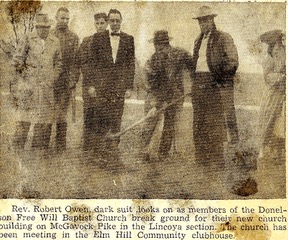
Before it’s lost, I want to honor the story of The Donelson Fellowship’s first pastor, because I owe him a lot! He paved the way for those of us who followed him. His name was Robert Owen, and his son Dennis helped me remember and record his story. Rev. Owen was born early in the 20th century to a farmer and his wife in Florida. Robert was the oldest of four boys. Their mother died when Robert was nine, and Robert’s father had to sell the farm to pay her medical bills. Mr. Owen was so distraught about loss of his wife and farm that he went out to the barn, fell on his face, and asked the Lord to take his life. God didn’t do that, but afterward his young son Robert mostly grew up in the homes of grandparents, uncles, and aunts.
Robert entered the Navy during World War II and served as the desalination sailor aboard ship, using a process to turn salt water into drinking water for the others on the vessel.
After the war he married Mary Louise, whose young soldier-husband had been killed in Europe shortly after the beginning of the D-Day invasion of Europe. The man’s body was seen on a riverbank outside the city of Cherbourg, France. Until Dennis told me, I didn’t realize TDF’s original pastor’s wife was a war widow who had married a sailor who survived the conflict.
Mary Louise went to Piney Grove Free Will Baptist Church in Chipley, Florida, and one day Robert went with her. Within two weeks, he had committed his life to Jesus Christ. In time he became a deacon, and shortly afterward he felt God’s calling him into ministry.
By then, Robert and Mary Louise had three children, Helen, Kinnie, and Dennis. The family moved to Nashville where Robert enrolled in Free Will Baptist Bible College. He soon became acquainted with the small group in Donelson who wanted to start a church, especially the Miller and Rudy families. They had begun meeting in a little house on old Elm Hill Pike, a small white structure I remember seeing when I first moved to Nashville in 1980. It served as a clubhouse for various community groups.
Robert became the church’s first pastor and served part time. He supplemented his meager income by working at the Rudy Sausage Company where he cut hams with a huge knife. He afterwards kept the knife, which had been well worn down, as a souvenir of those days. Robert and Mary Louise were well liked, visited people, and saw the church begin to grow.
While he was pastor, the little congregation bought its current property on McGavock Pike, selling church bonds to finance the purchase. They dug a basement (which now serves as the meeting space for teenagers), and Dennis remembers as a child walking around the top blocks praying he wouldn’t fall into the basement and die.
When money ran out, the members put a temporary roof over the basement, and that became the church’s first sanctuary. With great excitement, they planned their first worship service on their new property for a particular Wednesday night. But that week it rained so hard the basement flooded, and instead of meeting for their opening service they all showed up to bail water, mop floors, and repair the damage. Jeff Nichols and I were told of that night many times. In a strange way, it bonded the new members and attenders. (I myself experienced such a night during the Nashville flood of 2010, when another new basement on our property flooded despite our frantic efforts bailing and mopping and sandbagging.)
Soon the church was meeting regularly in their basement chapel with Robert presiding and preaching. “Dad enjoyed his time there,” Dennis told me. “The people were very good.” Eventually Robert heard of churches back in his home state needing pastors, and he felt he should return to Florida. Over the years Robert Owen faithfully pastored a number of churches before he passed away on September 7, 2020.
When I served as pastor, we wanted to honor all the former pastors and we would invite them to special anniversaries and homecoming events. Robert and Mary Louise always showed up, quiet, thankful, and ready to say a word about those opening days. I want to always honor him as my predecessor and keep alive the story of his leadership, his working in the sausage factory, and the muddy night the church tried to have its first service. As I said about the Christian stories of American history in 100 Bible Verses That Made America, stories like these shouldn’t be lost, for they are our legacy. They must be passed down, often remembered, and cherished by those of us who are pressing onward.